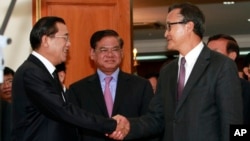PHNOM PENH & WASHINGTON DC - Cambodia’s ruling and opposition parties returned to the negotiating table on Tuesday, seeking to end a political impasse stemming from an election the opposition says was deeply marred by fraud.
The two sides met for three hours at the National Assembly, the main legislative body for the country and one that the opposition Cambodia National Rescue Party has boycotted in the wake of July’s election.
No decisions were made in the first round of talks, but more discussions are scheduled for later this week.
Details of the negotiation were kept under wraps, as the two sides try to find ways to arrange power-sharing in the legislative and executive bodies that both find fair.
Tuesday’s political discussions come after a visit to Cambodia by Scot Marciel, Principal Deputy Assistant Secretary for East Asian and Pacific Affairs at the US State Department, who told reporters Monday that the US was not trying to impose a solution on Cambodia.
That stance met with mixed reaction from outside observers.
“Obviously the Cambodian people have to play a central role on that, but it doesn’t mean that he and the United States government get a free pass to walk away from the situation,” Phil Robertson, deputy director of Human Rights Watch, told VOA Khmer on Monday.
The international community, including the US, should have an opinion on whether Cambodia is meeting its international obligations, he said.
“In fact, the government is looking to the international community to determine how hard and fast the government can push against people who are raising issues that the government doesn’t like,” he said. “If the international community is watching quite closely, the government will slow down and will be a little bit more quiet, and they will be a little more circumspect about the way they go after people. When the international community is looking away, or walking away because they think the whole thing is done, that is exactly the time that the government goes after its opponents.”
Marciel told reporters Monday that the solution to Cambodia’s political deadlock “has to be a Cambodian solution.”
Sok Touch, dean of Khemarak Univesrity, told VOA Khmer that the statement meant the US is maintaining a stance that calls for Cambodia to solve its problems democratically.
Koul Panha, head of the election-monitoring group Comfrel, called the statement “consistent with the recommendations of many countries that want Cambodia to solve the election dispute and the political dispute.”
“Both parties are trying to solve it now,” he said.
No Progress Reported as Political Parties Meet Over Deadlock
- Heng Reaksmey
- Sok Khemara







